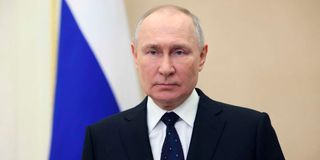Minister warns of Putin cyber blitz against UK over Ukraine

Russian President Vladimir Putin. I had never heard of the National Cyber Security Centre until Minister Oliver Dowden announced that it had detected imminent threats to British national security from cyber-hackers loyal to President Putin.
I had never heard of the National Cyber Security Centre until Minister Oliver Dowden announced that it had detected imminent threats to British national security from cyber-hackers loyal to Russian President Vladimir Putin.
Mr Dowden said the security centre had spotted the rise of several Moscow-aligned groups sympathetic to Russia’s invasion of Ukraine, whose focus had turned to the UK and its allies.
“Instead of seeking to profit from or spy on us, their primary motive is to destroy or disrupt our national infrastructure,” the minister said.
He announced that the security centre had issued “an official threat notice” to critical operators of the national infrastructure such as power, health and transport bodies.
Disclosing such a move publicly is not something the security authorities would normally do, but Mr Dowden said, “We believe it is necessary if we want these companies to understand the current risk they face and take action to defend themselves and the country.”
Ideologically motivated
Mr Dowden said Britain’s support for Ukraine meant such groups are “ideologically motivated rather than financially motivated, more opportunistic and less likely to show restraint”.
The National Cyber Security Centre is part of GCHQ, the Government Communications HQ responsible for providing intelligence to the government and the armed forces, and its head, Lindy Cameron, backed the minister’s warning.
She said, “I don’t think we are doing enough to defend our infrastructure from the cyber threats emerging from Russia-aligned groups.”
* * *
The revelation of a threatened cyber blitz against this country and its critical services is just the latest indication of how some aspects of modern wars can be fought, not by bullets and bombs but by computers and intelligence.
Mr Dowden’s warnings coincided with increasing concerns expressed recently about the technological revolution and work on Artificial Intelligence programmes which simulate human behaviour or human thinking in order to solve problems.
Even the boss of Google, Sundar Pichai, has admitted that the idea of a world dominated by AI keeps him awake at night.
And Dr Geoffrey Hinton, the genius widely seen as the godfather of AI, has quit his job at Google, warning about the growing dangers from developments in the field.
Dr Hinton, 75, a British-Canadian computer scientist, told the BBC that some of the dangers of AI chatbots, which simulate human conversation, were “quite scary”.
He said, “Right now, they are not more intelligent than us, as far as I can tell. But I think they soon may be.”
Last March, an open letter signed by acknowledged leaders in the AI field called for a pause on all developments more advanced than ChatGPT, the current version of the AI chatbot, so that robust safety measures could be designed and implemented.
Yoshua Bengio, a co-worker of Dr Hinton, wrote that because of the “unexpected acceleration” in AI systems, “we need to take a step back.”
* * *
The scene: The meat section of a busy supermarket on the morning after the coronation. A young man wearing a black zippered top inspects the larger cuts of beef and lamb, then picks one up and pops it down his front.
Without checking who might be watching, he then selects another hefty joint, secretes it in the same way then heads for the exit.
“Oh,” I think, “he’s going for a basket.”
But no, he walks casually past the security guard and the security alarms and into the street.
So that’s how it’s done, I think, a shoplifter in action!
No doubt the supermarket is a great deal richer than this young man; on the other hand, if it loses too many goods to thieves, it puts up the prices for the rest of us.
On reflection, I have to admit, honesty is the best policy.
* * *
Three accountants and three engineers are taking a train to a conference.
The accountants buy three tickets but the engineers buy only one.
“How can three people travel on one ticket?” the accountants wonder.
When the journey starts, the accountants take their seats but the three engineers all cram into the carriage toilet. The inspector comes by, knocks on the toilet door and says, “Tickets, please,” whereupon a hand comes out holding a ticket, which the inspector clips and moves on.
When the conference ends, the accountants decide to repeat the engineers’ trick and buy only one ticket. But they are astonished to see the engineers buy no tickets at all. “How can three people travel without a ticket?” they wonder.
When the journey starts, the three accountants copy the example of the engineers and cram into the carriage toilet. One of the engineers then leaves his seat, knocks on the toilet door and says, “Tickets please.”





